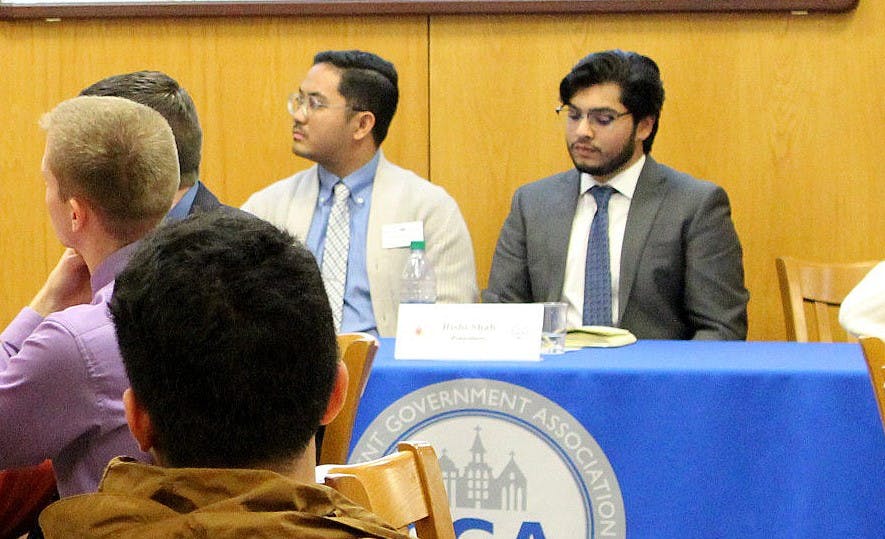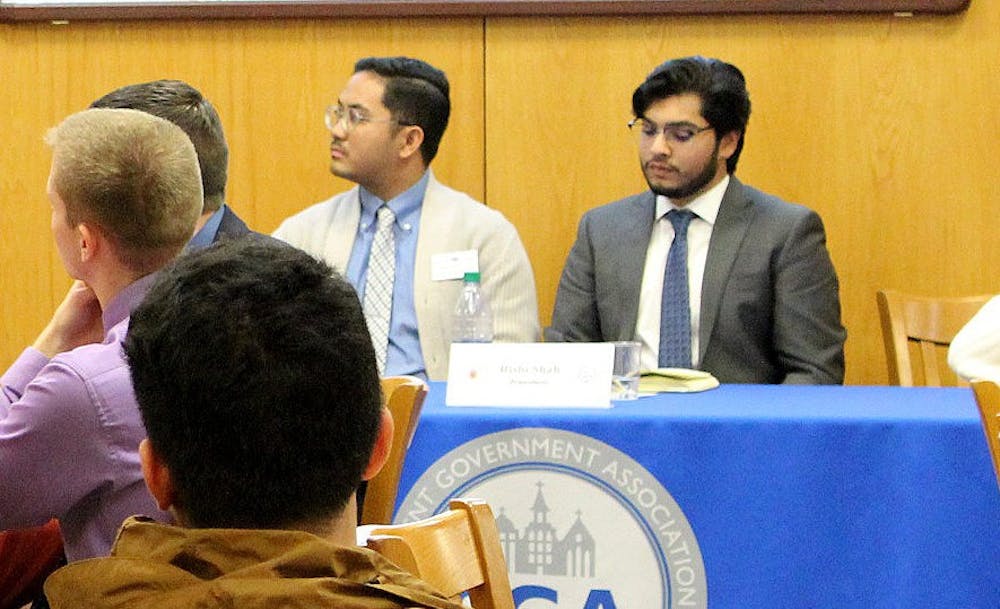With several large Student Government Association (SGA) initiatives now underway, President Rishi Shah and Vice President Frank Mabalatan are slowly beginning to wrap up their year in SGA before the end of their term in nearly four months.

Shah, who is in his second term serving as president after winning against Anthony Chen last year, will graduate this May, ending his four years of service with SGA. Mabalatan, a junior, said he is not planning to run for reelection in the spring, leaving the seats for both President and Vice President open.
In an interview with The Setonian, Shah and Mabalatan reflected on the progress of their term and shared their thoughts on the future of the University and what they have learned as leaders.
Shah said now serving in his second term, he has been “in the groove of things” and feels like he has settled in to this role with the connections he has with students, faculty and administrators on campus.
“It’s no longer an introductory period,” Shah said. “Whenever things need to get done, they know who to contact, and I know who to go to.”
For example, Shah noted that several large initiatives such as the Strategic Planning Initiative by the Office of the President and the affordability agenda by the VP for Enrollment Management and advising by the Provost. “All those committees that were being formed came straight to SGA because they knew we had the resources to put the students on, which has been great because we had that insight and we put it to use on these big initiatives,” he said.
Shah added that he also has more “freedom” to do what needs to be done “without walking on eggshells.”
Mabalatan said being the vice president is “one of the most ambiguous jobs” he has ever had.
“I really appreciate the community building,” Mabalatan said. “With the Board of Regents initiative the executive board is rallying around, we want the students to be a representative of the institution, not just the administration, not just business executives who are called to be on the Board of Regents. In doing that, we had to understand who the students are.”
Mabalatan said what he reflects on the most is his self-awareness being the vice president and making sure he does the due diligence in reaching out to all the students and trying to account for all of them.
“A lot of times, a lot of things happen on a college campus, local politics, federal politics — they’re pushed by the loudest voices,” he said. “In the ambiguity of my role in SGA, I have kind of stepped into my own self-defined role where I continuously find not the loudest voice, but the necessary one. Vice presidents before me have stepped into something that they define for themselves because of this ambiguity that shrouds the position.”
Mabalatan said he feels like the vice president should be the “extra set of ears” to the campus, whereas the president is the point of contact for administrators and other community members who want to get their attention.
As for some of the major policies Shah and Mabalatan have been working on and the slow pace that drags them throughout the year, Shah commented on why some of these initiatives are taking an extensive period of time to be completed.
“Personally, I don’t necessarily expect to see results immediately during my time at Seton Hall,” Shah said. “With initiatives like parking, the laptop program, the Board of Regents seat, I expect that we put enough into these initiatives, if that there are working task groups all over the University working on them.”
One initiative that Shah said took about three or four years while he was in SGA was the Mobile Computing Program, in which the administration is now looking into.
“The style of work has to be future-working and culture-changing,” Mabalatan said. “Whether it’s regard to the Board of Regents student seat, having that voice there would be important. But these are goliaths that SGA is trying to address, and I think an important thing to reflect on our part is to be aware of not completing [the initiatives] to [their] entirety, but rather putting things out into the world and out to the campus that will establish and allow that cultural change to happen.”
In recent months, the University has seen significant changes in administration, like the changes in the administration. Shah noted that one of his successes in his term was connecting SGA and himself with new administrators like Dr. Shawna Cooper-Gibson.
Mabalatan said one of the biggest successes of his term were the “incremental changes” that are “not very appealing from the outside,” but they have “laid these bricks to build the house.”
“We’re laser focused on these five points, and now it’s just a matter of lining them up and knocking them down,” Mabalatan said.
One initiative that Shah said he wished he worked on more was collaborating with students and administrators for the Board of Regents student seat. “We were so caught up in the weeds with it that we didn’t realize we didn’t do our due diligence in informing everyone about what’s going on,” Shah said. “The point and the initiative were there, it was just the communication that lacked. I just wish in the beginning that it could have been better.”
Mabalatan said one issue SGA struggles with is educating the constituency about the work that its doing and disseminating information to the student body. “We need to translate it to the student perspective because I know in our experience, we’ve had a hard time trying to understand the administration’s perspective as students,” he said. “Over time, we got a handle on it, but has the rest of the student body? That’s a question we have to address.”
Jack Zhuang, a senior history major, said although he does not know the entirety of SGA’s work, he feels like they are being “overly ambitious.”
“I don’t think awareness is the problem,” Zhuang said. “In my day-to-day life here, I’ve heard about a lot of changes, but the notable changes I see are being done by the University, not SGA. You can’t put more credit on SGA when majority of these initiatives were really done by the University.”
Now in his senior year, Shah said being a leader in SGA has helped him gain unique skills that not many other students in higher education get to have. Halfway through his senior year, Shah said he doesn’t regret anything serving in SGA. However, he said he feels that he did “miss out” on a lot of typical college student life being the president.
“I always had to maintain this image of being a professional and an adult,” Shah said. “There’s always eyes on you and people making ‘Mr. President’ side comments. It’s really scary. Especially with people who I’m not really close to, I’m not going to just get away from that image. I don’t have the opportunity to show them my insecurities or my real self because I don’t want them to take that and take away from the organization that I represent.”
Mabalatan said he is not running for another term. “I am not running because I find that my time in SGA is not needed anymore beyond this term,” he said. “Looking at the new members of SGA and the leaders in the Senate, they have a new perspective, and they have a different mind to the perspectives of these issues that I believe is more pertinent to the growth of SGA.”
Liam Oakes can be reached at liam.oakes@student.shu.edu. Find him on Twitter @lm_Oakes.





